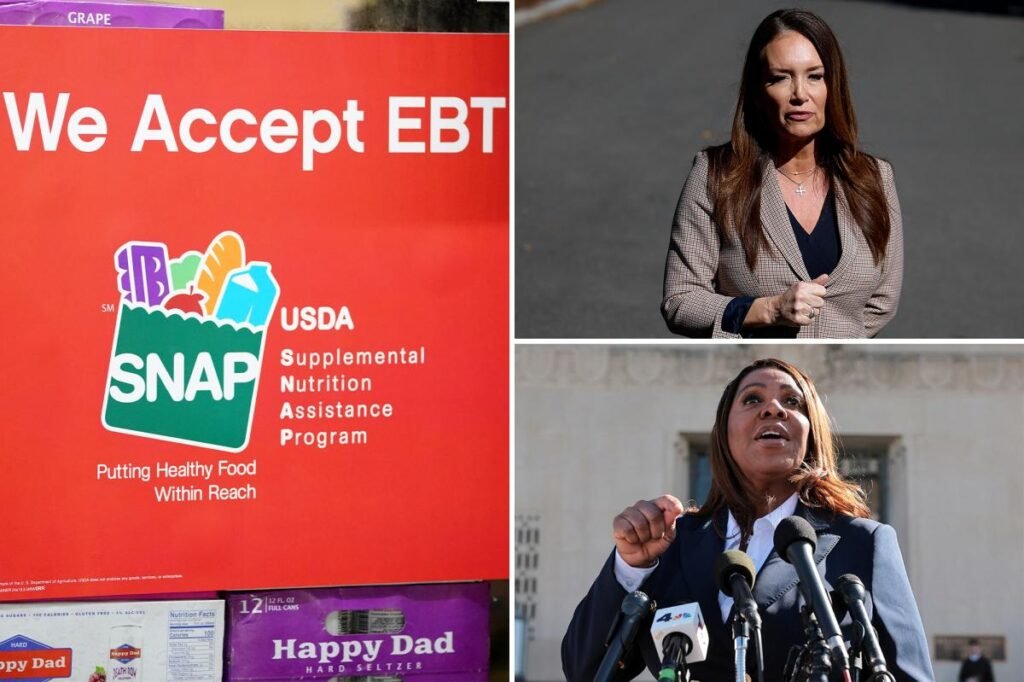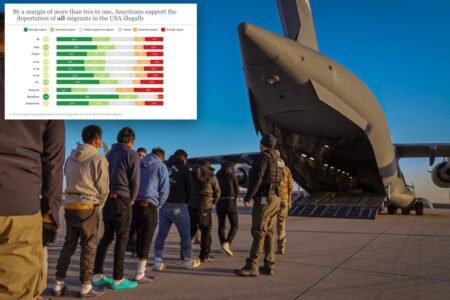More than two dozen states filed a lawsuit Tuesday accusing the US Department of Agriculture of illegally cutting off food assistance to over 42 million Americans during the government shutdown.
New York Attorney General Letitia James and 25 other Democratic state leaders, including those in the District of Columbia, blasted the USDA’s decision to suspend November payments for the Supplemental Nutrition Assistance Program, arguing it violates federal law.
The USDA warned in a notice that the “well has run dry” for SNAP benefits, also known as food stamps, blaming Democrats for holding up the government shutdown, and in turn, funding for the critical program.
“Millions of Americans are about to go hungry because the federal government has chosen to withhold food assistance it is legally obligated to provide,” James said in a statement.
“SNAP is one of our nation’s most effective tools to fight hunger, and the USDA has the money to keep it running. There is no excuse for this administration to abandon families who rely on SNAP, or food stamps, as a lifeline. The federal government must do its job to protect families,” she added.
SNAP benefits were safe in October because states received federal funding before the government shutdown began on Oct. 1.
But this Saturday could mark the first lapse in SNAP funding in 60 years.
The attorneys general of Arizona, California, Colorado, Connecticut, Delaware, Hawaii, Illinois, Maine, Maryland, Massachusetts, Michigan, Minnesota, Nevada, New Jersey, New Mexico, North Carolina, Oregon, Rhode Island, Vermont, Washington, Wisconsin, and the District of Columbia, as well as the governors of Kansas, Kentucky, and Pennsylvania, have joined in the lawsuit.
The coalition criticized the USDA for not utilizing $6 billion in contingency funds to sustain SNAP operations during the funding lapse.
The states also argued that the move violates the Food and Nutrition Act, which requires that “assistance under this program shall be furnished to all eligible households,” as well as the Administrative Procedure Act, alleging the axing of benefits is “arbitrary and capricious,” the AG’s office said.
The lawsuit seeks a temporary restraining order to force the USDA to put the contingency funds towards November SNAP benefits to prevent residents from losing access to food.
James and 22 other attorneys general already wrote to Agriculture Secretary Brooke Rollins on Friday, requesting that the government use the funds to cover most of the benefits.
In response, the Trump administration declared it would not use the contingency funds, claiming they weren’t “legally available.”
A USDA memo that surfaced Friday maintained that “contingency funds are not legally available to cover regular benefits,” and cited major hurricane Melissa as a reason to reserve funds for people in disaster areas.
The memo contradicts a since-deleted shutdown plan prepared by the USDA earlier in the year, which maintained that the department is legally obligated to continue issuing SNAP benefits during a shutdown, The Hill reported.
Some Senate Republicans are divided over whether to vote on a standalone bill to keep SNAP benefits running for their constituents, many of whom live in rural Republican districts, Politico reported.
Senate Majority Leader John Thune told the outlet that GOP senators would discuss the funding issue during their Tuesday policy lunch, while arguing that the best way to fund the program was for Democrats to vote to end the shutdown, the outlet reported.
Senate Appropriations Chair Susan Collins and other Republican senators signed on to a bill from Sen. Josh Hawley (R-Mo.) to keep the program running as the shutdown lingers. They plan to push it to a vote this week, according to the publication.
When asked by Politico if she wants the administration to allow SNAP benefits to roll out in November, Collins replied, “I certainly do.”
“If we could figure out a way to find something Democrats will vote for, we’d love to do that, but right now, we could fully fund the SNAP program by reopening the government,” Sen. Markwayne Mullin (R-Okla.) told the outlet.
“We could do that in 30 minutes from now,” he said.
Children and seniors make up nearly 60% of SNAP recipients, and more than a million veterans depend on the program.
In New York, the program serves roughly 3 million people, including nearly a million kids and more than 600,000 older adults.
The average monthly benefit is $187 per person, often handed out to those with incomes at or below the poverty level.
Many states have encouraged residents to locate food banks and stock up on goods to carry them through the next month.
Read the full article here












